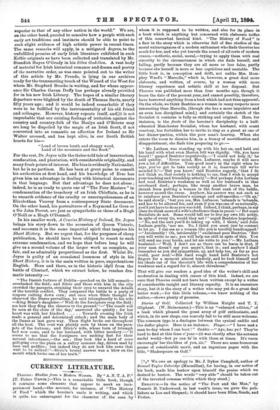CURRENT LITE]ATURE.
Theories: Studies from a Modern Woman. By "A. N. T. A. P." (T. Fisher Unvrin.)—This is a remarkable little book, though it contains some elements that appear to mark an inex- perienced band,—the account, for instance, of "The History of Food" which the heroine's uncle is writing, and which is quite., too extravagant for. the character of. the man by
whom it is supposed to be written, and also for its place in a book which is anything but concerned with elaborate trifles of this somewhat farcical kind. "The History of Food" is a flaw in the story which is otherwise full of fine studies of the moral extravagances of a modern enthusiast who finds theories too much for her, and who yet travels the round of all sorts of modern crazes,—testhetic, social, moral,—trying to apply them with real sincerity to the circumstances in which she finds herself, and failing, partly because they are all more or less false, partly because she herself is more or less capricious and unstable. The little book is, in conception and drift, not unlike Mrs. Hum- phry Ward's "Marcella," which is, however, a great deal more elaborate, and written, of course, by a woman with more literary experience and artistic skill at her disposal.. But Theories was published more than four months ago, though it bears the date of the present year, and cannot possibly, therefore, have borrowed anything from a book which had not then appeared. On the whole, we think Beatrice as a woman in many respects more interesting than Marcella, (though she has a more impulsive and an even less disciplined mind,) and certainly the sketch of the Socialist it contains is fully as striking and original. Here, for instance, is the finale of the heroine's discipleship to a half- educated Manchester Socialist, whom her husband, with scant courtesy, has forbidden her to invite to stay as a guest at one of her dinner-parties, within the poor man's hearing. When she enters the room to dismiss him, in a frenzy of mortification and disappointment, she finds him preparing to go :— " Mr. Latham was standing up with his hat on, and held out his hand with what even Marion felt was dignity. Oh, you have heard !' gasped Beatrice impulsively.=I could not help it,' he said quietly. 'Never mind, Mrs. Luf moor, maybe it will save you a lot of difficulties. Your good man's in the right when he says you've got to take society as it is, leastways till we've
mended But you know,' said Beatrice eagerly, 'that I do not think so, that society is nothing to me, that I wish to accept your teaching and friendship utterly.'—But perhaps John Latbam had read Beatrice's weakness as well as her husband's in that overheard duel ; perhaps, like many another brave man, he shrank from putting a woman in the front rank of the battle, however sacred the cause. Anyhow, his answer was not such as to reinforce poor Beatrice's courage and self-sacrifice.—' Oh ay,'" he said slowly ; 'but you see, MS. Lufmoor, 'usbands is 'usbands, and has to be allowed for, and even if you was one of us naturally, you'd yet have to do as you was told. Indeed, I think, perhaps, in my class we think more of a wife's obedience than in yours.'—' But some Socialists do not. Some would tell me to live my own life nobly, in spite of every tie, would they not ? ' urged Beatrice hopelessly. = No, not the sort you'd do taking up with, I think,' said John Latham gently, 'nor me. No, I think you must just be content to let go. I can see as a woman like you is terribly handicapped.'
Intolerably ! Oh, intolerably ! ' exclaimed poor Beatrice. But you will write to me; you will help me still in spite of this. You will send me your books, and let me write to you ? '—Mr. Latham hesitated.—' Well, I don't see as there can be harm in that, if your man doesn't say you mayn't, that is ; and anyhow I shall remember as you did sympathise, ay, and help too, as far as you could, poor soul:—His hard rough hand held Beatrice's hot fingers for a moment almost tenderly, and he took himself and his ideals out of the theorist's life with a comprehension of her weakness and a regard for it, almost chivalrous."
That will give our readers a good idea of the writer's skill and moderation in dealing with crazes of this kind. Indeed, we are sure that Theories could not have been written except by a writer of considerable insight and literary capacity. It is an immature story, but it is the story of a writer who may yet do a great deal better work ;—for this little volume,—we know nothing of the author,—shows plenty of promise.


































 Previous page
Previous page